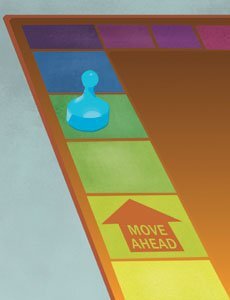One way to help advanced students move ahead and learn at their own level.
Professional development. What thoughts and feelings do those words conjure up for you? Excitement? Boredom? A chance to improve your skills and learn new, interesting teaching strategies? Or a painful time of listening to someone talk about a topic you already know?

We’ve all been there—sitting in a required in-service class listening to someone go over Bloom’s Taxonomy or some other concept or strategy that we’ve been using effortlessly for years. We grumble our way through the session, irritated that we have to sit on our butts “re-learning” a topic we could have taught just as well ourselves, if not better. Partly we’re irritated because we have so much else to do! Many teachers would categorize a situation like this as wasted time.
Of course, not all professional development is like that. But I use the example because it is a great way to help teachers relate to what a gifted kid experiences when the material being taught in class is not at the right readiness-level for him or her. We don’t like it when someone else puts us into that kind of a situation, yet we routinely do the same to the gifted students.
In part, we’ve been set up. Most college teacher preparation programs don’t teach future teachers how to adequately meet the needs of the gifted students who will end up in our classrooms. Consequently, we walk into teaching missing some very important tools.
One of the handiest tools for teaching gifted children is “curriculum compacting.” You could equate it to an adjustable hammer.
Tamara Fisher, author and gifted education specialist, recommends the following Web sites:
Hoagie’s Gifted Education Page
www.hoagiesgifted.org/
Nicknamed the “All Things Gifted” site because it seems to include information on just about everything out there on gifted education.
Supporting Emotional Needs of the Gifted (SENG)
www.sengifted.org/
Includes many expert-written articles on social and emotional topics and has excellent community forums.
The National Research Center on the Gifted and Talented
www.gifted.uconn.edu/nrcgt.html
Run by researchers from the University of Connecticut and the University of Virginia, the NRC/GT focuses on research topics relevant to the identification of gifted individuals from underrepresented groups.
A Nation Deceived
Volume I:
www.accelerationinstitute.org/ Nation_Deceived/ND_v1.pdf
Volume II:
www.accelerationinstitute.org/ Nation_Deceived/ND_v2.pdf
A 2004 landmark report on research on education acceleration (subtitled “How Schools Hold Back America’s Brightest Students”).
National Association for Gifted Children
www.nagc.org/
The national organization for parents, teachers, and administrators interested in spreading knowledge and awareness about gifted students and gifted education. Includes gifted-education standards.
Association for the Education of Gifted Underachieving Students
www.aegus1.org/
Focuses on awareness about and interventions for this often-misunderstood segment of the student population.
Center for Talent Development
www.ctd.northwestern.edu/
A Northwestern University program that offers a number of online learning opportunities for gifted students of all ages.
Center for Talented Youth
http://cty.jhu.edu/
A Johns Hopkins University program that actively seeks students with the highest academic abilities and provides challenging educational opportunities for them.
A Different Place
www.adifferentplace.org/
A compilation of many links on gifted topics.
Gifted Resources
www.giftedsources.com
Resources and links for gifted kids.
Curriculum compacting involves a few important steps, all with the aim of enabling students who have already mastered content to move on and learn new things.
A tip before you begin trying this strategy: Start small. Try it out first with a lesson you feel comfortable with. Be within (or close to) your own comfort zone for your inaugural attempts. This will help you to develop confidence in the strategy and in your ability to implement it, which will enable you to branch out from that point on.
So, what do you do? Well, first you have to determine which of your students are possible candidates for curriculum compacting. You probably don’t need to get too far into the school year to get a sense of which students complete their work quickly (yet still accurately), seem to have a wealth of outside information, and consistently score well with little apparent effort. These kids are usually good prospects for curriculum compacting.
Your next step is to pre-test these potential candidates. The pre-test can be the one from the course book (or whatever curricular materials you’re using), or it can be one that you create. It doesn’t have to be extensive. To use spelling as an example, it can be as simple as pre-testing the kids on that week’s words before they’ve been given the list. With other subjects, the pre-test should cover the main objectives that you want the students to learn in the unit.
By examining the pre-test results, you’ll be able to see which students have already mastered all of or large portions of the content. Continuing with our spelling example: If a child scores a 100 percent on his spelling pre-test before you’ve even given him the list to study, before he’s written the words ten times each, before he’s used each of them in a sentence, before he’s looked up all of their definitions, and before studying them at home with mom and dad—well, then, why the heck does he have to still jump through all those hoops throughout the week? He shouldn’t have to. He’s just proven to you that he has mastered that content. Now you can compact his curriculum.
In the case of spelling, he could be given a harder set of words, ones he hasn’t mastered yet, and still do the same assignments with them. For other subjects, the compacting process can be more complex. Let’s say a student shows through her pre-test that she has mastered six of the science unit’s eight objectives. Well, in this case, the student has mastered much of the content, but not quite all of it. For the portions she hasn’t yet mastered, she will be learning right along with the rest of the class. But for the portions she has mastered, she can now “buy time” (so to speak) to explore the topic in greater depth, do an independent project on a subject of interest to her, work with a mentor who can expand her horizons on the topic, move ahead in the curriculum, write an essay on the topic, etc. A thousand possibilities present themselves. Just which ones the student pursues will depend in part on available resources, available space, available time, the child’s interests, and your own flexibility.
The essence here is that the child should be allowed to learn. If this student were forced to sit through all of the lessons on the content she has just proven she’s mastered, then what exactly is she learning? That school is for jumping through hoops, whereas real learning takes place when she gets home and can read her books and conduct experiments in her homemade basement laboratory? School should be for learning, too! But unless we use strategies like curriculum compacting, it will continue to be a place where gifted kids mark time, re-learning information they had the first time.
You don’t like to re-learn something you’ve already mastered, do you? Yet it’s ironic, isn’t it, that we place roadblocks in front of kids who want to learn something new. Let’s start tearing down those roadblocks!




